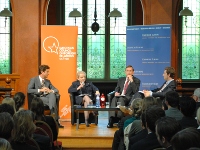Registration
You will receive an email confirming your registration.
At an event hosted by Carnegie Europe and the European Council on Foreign Relations in Brussels, former U.S. Secretary of State Madeleine Albright made the first public presentation of the recommendations of the NATO-appointed Group of Experts on the Alliance’s strategic concept for the coming decade. Dr. Albright was joined by Vice-chair of the Experts Group, and former Royal Dutch Shell CEO, Mr. Jeroen van der Veer. The session was moderated by Carnegie’s Fabrice Pothier and Daniel Korski, senior policy fellow at ECFR.
The Primacy of Article 5
NATO must continue to treat collective defense as its core purpose, reflecting the primacy of Article 5 of the Washington Treaty, the founding act of the Alliance, and the firm conviction that the security of each ally cannot be separated from that of all, Dr. Albright said. To achieve this goal, NATO must:
- Maintain a flexible mix of military capabilities, including conventional, nuclear, and missile defense;
- Conduct appropriate contingency planning and military exercises so that allies may feel confident that their borders will indeed be protected.
Increased Versatility
However, Dr. Albright continued, in the near future the alliance will face a new generation of dangers. These threats include violent extremism, nuclear proliferation, cyber assaults, and attacks on energy infrastructure and supply lines. Since such perils can arise rapidly and from any direction, the alliance must become versatile.To this end, NATO should:
- Accelerate its military transformation;
- Improve its capacity for rapid response;
- Attach a higher priority to cyber defense;
- Increase the efficiency of military expenditure through joint procurement and specialization.
The Alliance’s Limits and Strategic Partnerships
There are limits to NATO’s resources and responsibilities, Dr. Albright said. The Group of Experts, she asserted, was united in the view that the alliance should explore every opportunity for strengthening its partnership ties, both as a pragmatic means for solving problems and as an instrument of political dialogue. With this in mind, Dr. Albright reflected on two key partnerships for NATO:
- NATO and the EU: The EU is NATO’s most important strategic partner. It is critical for NATO and the EU to operate in a more fully complementary manner, and forleaders in both organizations to agree on joint participation in meetings, fuller communication between military staffs, and more extensive coordination with respect to preventing and managing crises.
- NATO and Russia: It is clearly in NATO’s best interest to work with Moscow to respond to such shared concerns as terrorism, nuclear proliferation, piracy, and drug trafficking. A NATO-Russia joint missile defense programme can be a concrete way to strengthen the partnership. However, prospective NATO members in the Western Balkans and elsewhere in the Euro-Atlantic region have a right to fair consideration for joining NATO, based on the same guidelines that steered decisions about new members in the past.
A Political Community
NATO, Dr. Albright explained, is more than just a military alliance; it’s also a political community and an alliance of democracies. It should therefore make more regular and creative use of the mechanism for consultations created by Article 4 of the Washington Treaty.
Lessons Learned and Organizational Reform
Alliance leaders should benefit from lessons learnt in Afghanistan, Dr. Albright said, including:
- The imperative of political cohesion;
- The desirability of unified command;
- The value of effective planning;
- The importance of public communications;
- The need to deploy forces at a strategic distance for an extended period of time.
These steps, she continued, must be accompanied by a commitment to organizational reform. The Secretary General should have the authority and the mandate to streamline decision making, prune the bureaucracy, and identify savings that can be used for military transformation.
Public Support
NATO, Mr. Van der Veer emphasized, can only be successful if there is sufficient public support in member countries. Currently, support for NATO is quite high, especially across Europe, but it is slowly ebbing. To regain the confidence of the public, Mr. van der Veer continued, NATO must accomplish three chief goals:
- To have a good track record, which it does;
- To have a clear, easily definable strategy, which it has in the form of the strategic concept;
- To have transparency from the figures leading the organization, which has been the case with Secretary General Rasmussen.
